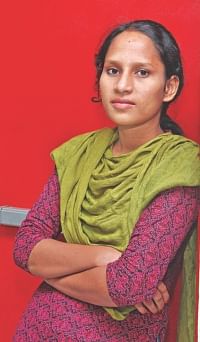Vow of a survivor
Vow of a survivor

It is not just her own childhood that 16-year-old Shirin Akhter Asa has vowed to save but the rights of all children of her village and, if possible, of the entire world as well.
"I want to work for children. But it is more important to make the grown-ups aware of children's rights," Shirin said. "The grown-ups need to understand the importance of education for children and what child labour, abuse and torture are."
With this very resoluteness, the slender teenager of about five feet had fought her family and relatives when they tried to marry her off four years ago.
"My cousin, a 21-year-old Hafiz student at that time, wanted to marry me. As he was financially well-off and did not want any dowry, my poor family considered the proposal lucrative," said 10th grader Shirin, relating the story of how she stopped her marriage when she was in Class-VI.
Shirin's father, Moinul Isalm, is a poor farmer from Arji Shimulbari village in Joldhaka upazila of Nilphamari. Despite his ill-health, he works on his own field to provide for his wife and seven children -- four daughters and three sons.
"My brothers are all very young. Except our eldest sister, all the siblings are schoolgoers," said Shirin.
When she heard about the marriage proposal, she recalled the lessons she had learnt at a children's group that receives training from Plan Bangladesh, a non-government organisation, and its associate bodies about child rights.
"I joined the group when I was in class V. My friends were part of the group and they encouraged me to join it."
Shirin first tried to convince her parents by telling them how the marriage would affect her education and health.
"But they instead asked what I would gain by studying," she said. Even her mother brushed aside the health implications of child marriage.
Faced with such resistance, Shirin sought help from her children group. When they too failed to convince her parents, she sought help of the influential people of the village, her teachers and local staff of Plan Bangladesh. This time, it worked.
"Together, they were able to persuade my parents to call off the marriage."
But the marriage pressure remained in place till her Junior School Certificate (JSC) examination she took two years ago.
"I was so upset that I could not study properly for my JSC exams," Shirin said. "So I told my cousin that if he really wanted to marry me, he would have to wait for 10 years, that is, till I finish my education."
To Shirin's relief, the cousin finally backed off and she devoted herself in studying hard and realising her dream of becoming an engineer.
Driven by this success, Shirin along with her group of 40 children is now working to prevent child marriage in her union consisting of nine villages. "So far we have been able to prevent 10 child marriages," she said, adding that their advocacy programme had made many parents aware of the ills of such marriage.
"However, there are some people who change the information in the birth registration form to overstate a girl's age," she said. "Then there are some parents who initially listen to us but later go to other distant villages and secretly marry off their daughters."
According to Shirin, the main cause of child marriage in their area is poverty. "Parents with three to four daughters also are prone to this practice ... Besides, there is a misconception in the village that the groom's side would ask for more dowry if the girl is older and educated."
Lack of awareness among people often makes Shirin and her group's work difficult. She recounted an incident in which they were almost attacked with sticks when they went to talk to a girl's family about the ills of child marriage.
"Sometimes, our own family, village elders and even the state represented by upazila chairman and union members discourage us from doing our work," said Shirin, adding that they try to prevent only the marriages against the girls' consent.
However, Shirin's struggle and work is now seen with respect by her family after she was invited to speak at the Spanish Congress last week on the occasion of the International Day of the Girl Child 2014 observed on October 11.
The week-long visit has rekindled her spirits. She now speaks with conviction against the government move to lower the legitimate age for marriage of girls from 18 to 16. "Now people show 15 and 16-year-olds as 18. If the marriageable age is changed to 16, they will try to marry off 13-14 year olds," she argued.
"Such a step would deprive hundreds of Shirins like me from a better education and life," she observed.